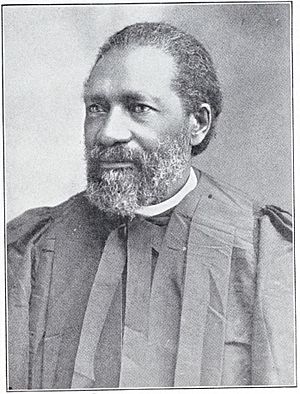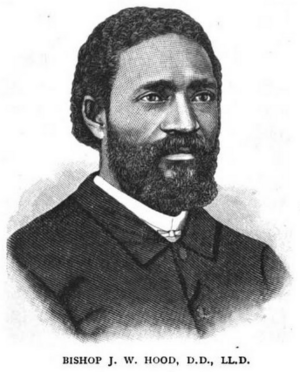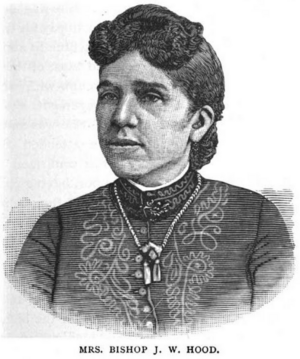James Walker Hood facts for kids
Quick facts for kids
James Walker Hood
|
|
|---|---|

Hood, c. 1910
|
|
| Born | May 30, 1831 Kennett Township, Chester County, Pennsylvania
|
| Died | October 30, 1918 (aged 87) |
| Nationality | American |
| Occupation | Minister |
| Political party | Republican |
| Religion | African Methodist Episcopal Zion Church |
James Walker Hood (born May 30, 1831 – died October 30, 1918) was an important leader in the African Methodist Episcopal Zion Church (AME Zion). He served as a bishop in North Carolina from 1872 to 1916. Before the Emancipation Proclamation, he worked hard to end slavery. During the American Civil War, he preached to Black people and soldiers in New Bern, North Carolina.
Hood became a very important religious and political leader in North Carolina. People called him "one of the most significant and crucial African American religious and race leaders" of his time. By 1887, he had started over 600 churches and built about 500 church buildings in Virginia, North Carolina, and South Carolina. He also strongly supported education, civil rights, and allowing women to become ministers.
Contents
Early Life and Beginnings
James Walker Hood was born on May 30, 1831, in Kennett Township, Pennsylvania. His parents were Harriet and Levi Hood. He had eleven brothers and sisters.
Even as a boy, Hood fought for his rights. He often spoke out against slavery. From 1848 to 1863, he rode trains in Pennsylvania. Conductors often tried to make him leave the first-class cars, but he usually won these arguments.
Around 1852, Hood was first allowed to preach. In 1855, he moved to New York City. The next year, he was given permission to preach in a church there.
In 1860, he became a deacon in the AME Zion church. He was sent to Halifax, Nova Scotia, to help with the church's mission there. In 1863, he moved to Bridgeport, Connecticut. After six months, he was sent as a missionary to North Carolina. He arrived in New Bern, North Carolina on January 20, 1864.
Moving to North Carolina
General Benjamin Butler invited churches to send missionaries to his area during the US Civil War. Black soldiers in New Bern did not have a chaplain. Hood often preached to these troops. He was called "chaplain" even though he didn't have an official military role. Hood was in New Bern during attacks by Confederate soldiers, but he was not directly in the fighting. He preached at Andrews Chapel and helped his church become the main church for Black people in the area.
Hood also became active in politics and social movements. In October 1865, he was elected president at a meeting in Raleigh, North Carolina. This might have been the first convention of Black people held in the South. In 1867, he was a delegate at the Constitutional Convention of North Carolina. He played such a big part that some people called the new constitution "Hood's Constitution." This document gave rights to Black people, especially regarding homestead law and public schools. Hood worked hard to get support for the constitution. In 1868, he became a commissioner for public schools and an assistant superintendent of public instruction in North Carolina. He held these jobs for three years.
In 1868, he demanded and got cabin passage on Cape Fear River steamships. This helped to integrate, or desegregate, the steamships on those rivers. The steamship agents said they only allowed it because the area was under military control. However, Hood said his right came from God. The steamships stayed integrated even after the Reconstruction era ended. Remembering his earlier fights on Pennsylvania trains, he also worked to ride in white-only train cars in the South.
Hood's school board office was in Raleigh, but his main church duties were in Charlotte, North Carolina. So, he traveled to Charlotte three Sundays a month to preach. On the other remaining Sunday, he preached for Methodist and Baptist churches in Raleigh. There was no AME Zion church in Raleigh yet.
Before 1870, he also worked for the Freedmen's Bureau as an assistant superintendent of schools. In this role, he started a department for deaf, mute, and blind students by 1870. He also tried to create an integrated State University. However, he was not successful because Democrats in the state legislature opposed it after they gained control in 1870. He was also a delegate to the 1872 Republican National Convention.
A National Leader
On July 1, 1872, James Walker Hood was elected bishop of the General Conference in North Carolina. He served as bishop until 1916. He was chosen to be a member of the Ecumenical Conference in London in 1881. He was also the president of that group in 1891 when it met in Washington D.C. In 1885, he led the first day of the Methodist Church's 100-year celebration in Baltimore.
Hood was a respected leader. In 1884, he published a book of sermons called The Negro in the Christian Pulpit. This was the first collection of sermons published by an African American.
Other Important Work
He helped establish Livingstone College in North Carolina in 1882. He also started and wrote for church newspapers and journals, like the Star of Zion newspaper and AMEZ Quarterly Review.
Hood strongly spoke out against smoking and drinking. He also supported the idea of women becoming ministers. He worked to bring Black Methodist churches together. He supported the 1898 Spanish–American War and continued to work for civil rights.
He was also a Master Mason. He became the Grand Master of the Most Worshipful Prince Hall Grand Lodge of Free and Accepted Masons in North Carolina. He later helped start the King Solomon Lodge, which was the first group of Masons for Black people in North Carolina.
Family and Later Life
James Walker Hood was married three times. Around 1853, he married Hannah L Ralph, who passed away in 1855. Around 1858, he married Sophia J. Nugent. They had four children before Sophia died in 1875. In June 1877, he married Keziah P. McKoy. They had three children together.
Six of his children lived past infancy: Gertrude C., Lillian A., Margaret J., Maude E., Joseph Jackson, and James Walker, Jr. His wife, Keziah, was also active in the church. She served as president and secretary of Zion's Women's Home and Foreign Missionary Society. She also wrote a column in the Star of Zion newspaper.
James Walker Hood passed away on October 30, 1918, in Fayetteville, North Carolina.
See also
 | Delilah Pierce |
 | Gordon Parks |
 | Augusta Savage |
 | Charles Ethan Porter |



